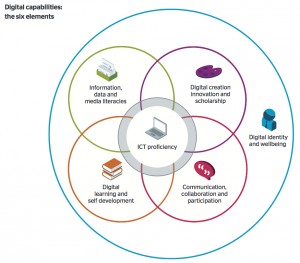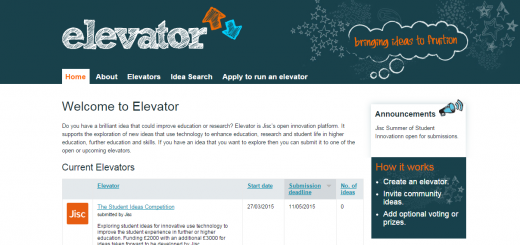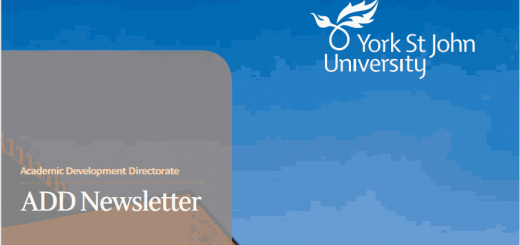ePedagogy Open Space Event Reflections
On Wednesday 18th May we had our first ePedagogy Open Space Event in the SU Café, with staff from across the University coming together to discuss issues relevant to them. This post is just a summary of some of the things that were discussed, including relevant links and resources for those who attended on the day, and hopefully useful for those who couldn’t make it too.
Screencast Feedback
The use of video, audio & multimedia has become a lot more mainstream in HE teaching, learning and assessment in recent times, mainly due to the accessibility and ease of use of equipment and software, but also due to the growing realisation of the pedagogic benefits of video content. See our blog post 10 Ways to Use Video in Your Teaching for some great examples.
In particular, the use of audio and video can enable staff to provide rich and personalised feedback to students, and research suggests that this approach can enhance a students sense of belonging by providing seemingly much more personalised feedback. There are a good range of research articles available on ‘Screencast Feedback’ on Academia.edu, and that might be a good place to start for anyone wanting to read more about the approach.
From a practical perspective, TEL have purchased a set of institutional licences for Screencast-o-Matic Pro, which are available for use by staff and students either at work, or on their own laptop or PC, and we’re on hand to support staff wishing to use the software.
Flipped Classroom
Flip teaching (or flipped classroom) is a form of blended learning which encompasses any use of technology to leverage the learning in a classroom, so a tutor can spend more time interacting with students instead of lecturing.
Flipped classroom is a reversed teaching model that delivers instruction at home through interactive, tutor-created videos and moves ‘homework’ to the classroom. Moving lectures outside of the classroom allows tutors to spend more 1:1 time with each student. Students have the opportunity to ask questions and work through problems with the guidance of their tutors and the support of their peers – creating a collaborative learning environment.
You can read more about the approach in our Flipped Classroom blog post, or watch the Flipping the Classroom course on Lynda.com.
Tracking Student Progress & Engagement in Moodle
Moodle offers a variety of options for enhancing student engagement & tracking progress, including Grades, Conditional Activities, Activity Completion, Course Completion, Open Badges, Course Reports, and Progress Bar & Engagement Analytics plugins.
Our blog post on Tracking Student Progress & Engagement in Moodle describes how you might use each of these features.
Learning Analytics
The NMC Horizon Report describes learning analytics as the “Field associated with deciphering trends and patterns from educational big data, or huge sets of student-related data, to further the advancement of a personalized, supportive system of higher education.”
Learning analytics is the measurement, collection, analysis and reporting of data about learners and their contexts, for purposes of understanding and optimising learning and the environments in which it occurs. Learning analytics is developing rapidly in higher education, where learning is happening more within online and hybrid environments.
The Higher Education Commission launched its fourth inquiry report, From Bricks to Clicks – The Potential of Data and Analytics in Higher Education, on 26 January 2016.
Jisc are currently working in collaboration to build a learning analytics service for the HE sector. As part of their Effective Learning Analytics project, YSJ will take part in a 3-day ‘Learning Analytics Readiness’ consultation in June, staff who are interesting in taking part can contact TEL@yorksj.ac.uk.
Digital Capability
 Digital Capabilities can be defined as the skills and/or competencies required for living, learning and working in a digital society (Jisc, 2015). The Jisc Digital Capability Framework provides a structure to help individuals understand what skills are needed and supports the development staff & students. Following extensive sector-wide consultation, and an evidence-informed approach to development, Jisc have produced an initial model of the framework which describes digital capability as six overlapping elements (right).
Digital Capabilities can be defined as the skills and/or competencies required for living, learning and working in a digital society (Jisc, 2015). The Jisc Digital Capability Framework provides a structure to help individuals understand what skills are needed and supports the development staff & students. Following extensive sector-wide consultation, and an evidence-informed approach to development, Jisc have produced an initial model of the framework which describes digital capability as six overlapping elements (right).
You can see more detail about each of these elements in ‘Building Digital Capability: the six elements defined‘ from Jisc.
In addition to the general definition provided above, Jisc have also created four example Digital Capability profiles for students, academics, researchers and leaders, and we’ll look at each of these in more detail in future blog posts:
- Digital Capabilities: Academic Profile
- Digital Capabilities: Researcher Profile
- Digital Capabilities: Student Profile
- Digital Capabilities: Leader Profile
Working in partnership and collaboration with Faculties, Directorates and other stakeholders, we hope to identify what digital skills are required of our staff and students, provide advice and guidance on meeting these needs, and ensure we are equipping students and staff with the tools and resources they need to improve digital capability at a local or institutional level through on-going consultation and development.
Look out for more blog posts about Digital Capability coming soon, in the meantime if you have any questions just get in touch.
Blogging
WordPress is an online platform that allows you to (individually or collaboratively) create websites and blogs (like the one you’re viewing now). YSJ has an installation of WordPress, meaning all staff and students have the ability to create websites and blogs at http://blog.yorksj.ac.uk/
Our webpage about WordPress has ideas and examples from YSJ about how you might use blogs for teaching, learning or assessment, and we also have a ‘Learn with Lynda: WordPress Essentials and WordPress in the Classroom‘ blog post with links to two great online courses.
#1MinuteCPD
Finally, there was a plug for the #1MinuteCPD blog, and 1MinuteCPD on Twitter, managed and delivered by colleagues over at MMU. It’s a great way to learn new digital skills in easy-to-manage bite-size chunks!
Thank you to everyone who attended the Open Space event, if you have any questions or comments then please leave them below, or contact TEL@yorksj.ac.uk.
Phil


